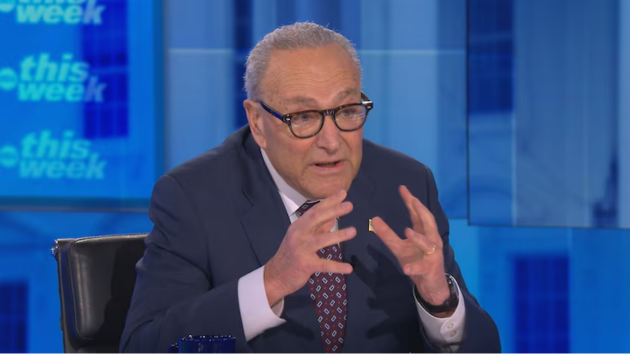Over 400 lawmakers, activists, actors and more sign letter calling on Biden to support bills on racial equity
Written by ABC Audio ALL RIGHTS RESERVED on April 5, 2024

(WASHINGTON) — More than 400 lawmakers, activists, civil rights leaders, musicians and actors have written a joint letter to President Joe Biden calling on him to support a list of Congressional bills on racial equity and reparative justice through executive actions and orders.
The letter, shared exclusively with ABC News, is the third such letter activists and lawmakers have sent to the White House this year. Signatories include NAACP President Derrick Johnson, attorney Ben Crump, National Action Network President Al Sharpton, stylist Law Roach, music executive Willie “Prophet” Stiggers, actress Erika Alexander and talk show host Tavis Smiley as well as Reps. Barbara Lee, D-Calif.; Sheila Jackson Lee, D-Texas; Cori Bush, D-Mo., and Jamaal Bowman, D-N.Y.
This latest effort Thursday comes after several months of unsuccessful attempts to secure a meeting with the White House. In the open letter, leaders desperately urged Biden that “the state of our Union depends upon” these bills.
Marcus Anthony Hunter, a UCLA professor of sociology and African American studies, who coined the phrase “Black Lives Matter,” is leading the effort. He told ABC News the letter is an accountability measure after months of work behind closed doors in Washington, D.C., and across the country.
“President Biden is actively delivering for Black Americans by executing his Day One commitment to advance racial equity and support for underserved communities,” White House spokesperson Rodericka Applewhaite told ABC News in a statement. “Since taking office, the president’s agenda has secured record-low Black unemployment, a 60% increase in Black net worth since the pandemic, achieved the fastest creation rate of Black-owned small businesses in over 25 years, and expanded access to homeownership and protections against housing discrimination.”
In the letter, leaders wrote: “As we face another election year, this conversation regarding urgent executive action on reparations is not just about policy — it is about the people of the United States of America, the fate of our democracy, national unity and national security.”
“We call upon you to meet with the Congressional members and advocates, as soon as possible, to tackle and attend to the unfinished work of advancing comprehensive equity through executive orders and actions,” they added.
On President’s Day this year, Feb. 19, lawmakers, activists and civil rights leaders sent two separate letters to the White House expressing a unified effort urging the Biden administration to work on racial equity.
Some lawmakers have worked diligently in the House and the Senate to bring attention to a list of wide-ranging bills focused on racial equity and reparative justice.
“Each of the pieces of legislation laid out would be a step towards repairing the harms of America’s original sin and centuries of discrimination, redlining and institutionalized oppression. We must be honest with ourselves and tell the truth about our history and how it impacts our communities today, so that together we can build a better future,” Bowman told ABC News.
“I would say behind the scenes, there have been some people who are open to the conversation about it, which is why I think about how the president can be a conversation starter so that we can actually see where people are,” Hunter told ABC news.
Over the past four years, lawmakers and advocates have been able to have conversations with Republican staffers in both chambers of Congress, Hunter said, adding that many Congressional Republicans have been inquisitive and have sought additional information on the bills.
Meanwhile, in Congress, some lawmakers have been working on the bills behind the scenes to bring attention to reparative justice.
In 2023, Bush made history by introducing a first-of-its-kind 23-page resolution that explores the extensive history of the enslavement of Africans, post-Jim Crow discrimination and other racially charged subjects.
Lee reintroduced a bill that called for the creation of the United States Commission on Truth, Racial Healing and Transformation. Her bill seeks to examine the effects of slavery, institutional racism and discrimination against people of color, as well as how history impacts laws and policies.
Bush and Lee’s bills aim to be companions to H.R. 40, the Commission to Study and Develop Reparation Proposals for African Americans Act. That bill was named for a promise made shortly after the end of the Civil War wherein Union leaders promised formerly enslaved families “40 acres and a mule” — a promise that was never fulfilled. H.R. 40 had been introduced in every legislative session since 1989. The bill languished in Congress for more than three decades until H.R. 40 passed out of the House Judiciary Committee in 2021. It has since failed to come to a vote in either the House or Senate.
“Clearly, we are at a tipping point that requires the reckoning of H.R. 40 to help restore national balance and unity,” Jackson Lee told ABC News. “Tragically, we continue to witness abhorrent attacks in Congress and across the country on diversity, equity and inclusion, rolling back decades of progress to eliminate division and intolerance — shocking efforts that echo back to the darkest periods of our nation’s history.”
During the 2023 State of the Union, Biden urged Congress to “come together to finish the job on police reform. Do something.” However, a year later, and with a new speaker of the House, Congress has not made much progress on police reform, or any reparative justice or racial equity programs.
“Until they do right by George Floyd and Breonna Taylor, nobody else is gonna get anything because that’s how they got into office,” Hunter said.
He noted that Biden has not been vocal on the issue of reparations, despite the numerous efforts across the U.S. on the issue. The issue of reparations is being taken up in states such as California, Illinois, Massachusetts, New York and North Carolina.
The letter’s timing on April 4 coincides with the anniversary of the assassination of Dr. Martin Luther King Jr., in an attempt to underscore the historic significance of his death to the struggle for equity and justice, Hunter said.
Lee told ABC News, “We’re going to keep pushing the Biden administration to take urgent action on restorative justice and reparations for our communities. As we enter yet another crucial election year, we risk turning back the clock even further on our progress toward truth and racial healing.”
Copyright © 2024, ABC Audio. All rights reserved.
 KVSP
KVSP 




